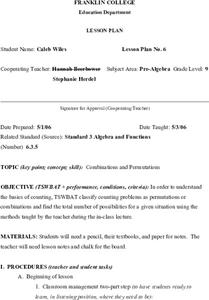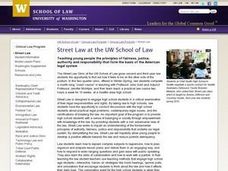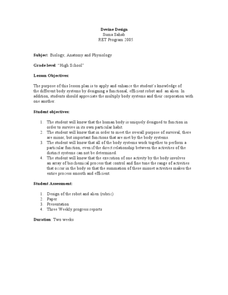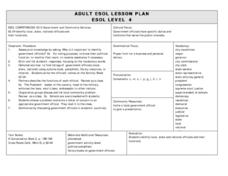Curated OER
Contributions of Ancient Egypt
Second graders identify the major contributions of ancient Egypt, including architectural monuments, e.g. the pyramids and Sphinx. They study the function of the pyramids as tombs for the Pharaohs.
Curated OER
Combinations And Permutations
Seventh graders investigate the mathematical concept using a lecture format. The lesson includes a classroom management section with suggestions for lesson execution. Students write a definition for the Fundamental Counting Principle....
Curated OER
Introduction to the Constitution: The First Three Articles of the Constitution, Separation of Powers
Students review the first three articles of the United States Constitution. In groups, they examine the three branches of government and their function. They follow the path of a bill until it becomes law and discuss Congress' role.
Curated OER
Fitness/Strength Conditioning Mini-lesson
Students describe a piece of strength conditioning equipment, what muscle (or muscles) are isolated, and how strengthening this muscle improve skill performance in the unit they are presently taking.
Curated OER
Away we Go
Students work in groups to calculate the costs of a trip to Six Flags amusement park. For this domain and range lesson, students calculate the least and greatest amounts of money needed for tickets, food, souvenirs, and airplane tickets.
Curated OER
Organization of Fairfax County Government
Students identify Fairfax County government as council-manager government, describe term of office held by members of Board of Supervisors and districts they represent, how Chairman of Board of Supervisors is elected and term and...
Curated OER
How Did That Get There?
Students evaluate the role of government in addressing land use and other environmental issues. They analyze the powers, responsibilities, and limitations of elected and appointed officials in the national legislative, executive, and...
Curated OER
Elections for Elementary Students
Students explore various websites that explain how primaries, caucuses, and general elections function. They view sample ballots, and analyze the executive branch, U.S. presidents, and citizenship.
Curated OER
Devine Design
High schoolers examine the functions of the different systems in the body. They discover how different systems must work together to make the body function correctly. They identify the needs of the body to help it survive.
Curated OER
Dear Congressperson...
Students identify their local, state, and national officials. They create a short blurb about each official and their function in office. Students choose an issue of concern they would like to write to their local official about,...
Curated OER
Geography: My Community as a Region
Students discuss the differences between formal, functional and perceptual regions in Alaska. They work in small groups to research community.
Curated OER
Government
Eighth graders analyze the purposes of government. They examine or assess the importance of citizenship to the individual or to society at large (e.g., the importance of voting). Students explain the structure and functions of the three...
Curated OER
Let's Make Lemonade Lesson 3: What's the Big Idea?
Students examine and decide on a service-learning project to perform. They design and execute posters that advertise the project using geometric shapes.
Curated OER
Lesson: Urs Fischer: Your Choice: Reality or Illusion?
Young analysts write a comparative essay, but about what? They compose a paper based on several critical discussion about reality and illusion, and how both are blurred in art. They analyze several theatre pieces that exemplify Brechtian...
Heritage Foundation
The House of Representatives
The House of Representatives has a lot of responsibility in the United States government. But how did it all begin, and why is it the way it is now? A comprehensive lesson answers all of these questions about the US Constitution and...
Heritage Foundation
Courts and Judges
If the Supreme Court is so supreme, why do all cases not just start there? High schoolers learn why every case does not start at the Supreme Court as well as the importance of hierarchy in the US judicial system in the 11th installment...
Heritage Foundation
The Senate
Do your learners struggle to understand the differences between the Senate and the House of Representatives? Help them develop an understanding of how the US Constitution's clauses affect the Senate's operations. A high-quality social...
Institute of Electrical and Electronics Engineers
Engineer a Dam
To begin the learning about dams, learners read (or are read to, depending on the age group) a passage about how dams work. Next, they work in groups to use the materials provided to build a small scale working dam. After the experience,...
School Improvement in Maryland
Building a Pyramid
After reviewing the structure and powers of the three branches of the US government, groups investigate a problem and research what is being done to address this criticism.
National Endowment for the Humanities
The 1828 Campaign of Andrew Jackson: Changes in Voting Participation
Learners give examples to indicate how voting participation changed in the first half of the 19th century, and make connections between changes in voting participation and the results of the election of 1828.
National Endowment for the Humanities
The 1828 Campaign of Andrew Jackson: Expansion of the Voting Base
Students give examples to indicate how the franchise was extended and limited in the first half of the 19th century, and cite some differences in the newly enfranchised population that could affect the way they would vote.
Curated OER
The President's Roles and Responsibilities: Communicating with the President
Students examine the roles and responsibilities of the U.S. president and their own roles as citizens of a democracy. They explore various websites, listen to a State of the Union address, and write a letter to the President of the...
Curated OER
USING MICROSOFT, POWERPOINT, WORD, EXCEL AND THE INTERNET TO CREATE A PRESENTATION
Explore the basic PowerPoint commands and options. They research information (including the WWW) related to an approved topic for presentation development. They create a presentation defined by specific criteria. They document research...
Curated OER
A Guide to Financial Analysis
Knowing good project management means knowing how to conduct good financial analysis. Learner are introduced to the ins and outs of financial planning as it relates to cost, benefit, and project capital investment.

























